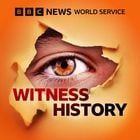In 1977, Nigeria hosted the largest festival of African arts and culture there had ever been. About half a million visitors attended, as well as 16,000 delegates including Stevie Wonder and Miriam Makeba.
Dozens of African nationalities, and people from the African diaspora were represented.
Headed by a military dictatorship, Nigeria spent hundreds of millions of dollars hosting nationwide events and building a new national theatre and festival village in Lagos.
Among those attending was Viola Burley Leak, an African American artist and designer exhibiting her artwork. She shares her experience of the spectacular opening ceremony and late-night revelry with Louis Harnet O’Meara.
An Ember production.
Eye-witness accounts brought to life by archive. Witness History is for those fascinated by the past. We take you to the events that have shaped our world through the eyes of the people who were there.
For nine minutes every day, we take you back in time and all over the world, to examine wars, coups, scientific discoveries, cultural moments and much more.
Recent episodes explore everything from the death of Adolf Hitler, the first spacewalk and the making of the movie Jaws, to celebrity tortoise Lonesome George, the Kobe earthquake and the invention of superglue.
We look at the lives of some of the most famous leaders, artists, scientists and personalities in history, including: Eva Peron – Argentina’s Evita; President Ronald Reagan and his famous ‘tear down this wall’ speech; Thomas Keneally on why he wrote Schindler’s List; and Jacques Derrida, France’s ‘rock star’ philosopher.
You can learn all about fascinating and surprising stories, such as the civil rights swimming protest; the disastrous D-Day rehearsal; and the death of one of the world’s oldest languages.
(Photo: Festival welcoming sign. Credit: AP)


